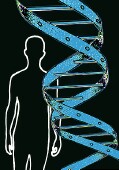
THURSDAY, Oct. 3 (HealthDay News) — People with autism are more likely to have gene deletions than those without the disorder, according to a new study.
The finding suggests that these deletions may increase the risk of developing autism, a neurodevelopmental disorder marked by difficulties in social interactions and communications.
Gene deletions mean that a person has only one copy of certain genes, when they should have two. The researchers said that these gene deletions may result in miswiring and altered activity of brain neurons.
“This is the first finding that small deletions impacting one or two genes appear to be common in autism, and that these deletions contribute to risk of development of the disorder,” study lead investigator Joseph Buxbaum, a professor of psychiatry, genetics and genomic sciences and neuroscience at the Mount Sinai School of Medicine, said in a school news release.
Further research is needed to learn more about the link between gene deletions and autism, he added.
For the study, Buxbaum and colleagues conducted genetic analyses of 431 people with autism and a “control” group of 379 people without the disorder. The investigators found 803 gene deletions in the autism group and 583 deletions in the control group.
The researchers also found that people with autism were more likely to have multiple gene deletions, according to the study in the current issue of the American Journal of Human Genetics.
Further investigation of the gene deletions in those with autism revealed that a significant proportion of them related to autophagy, a process that keeps cells healthy.
“There is a good reason to believe that autophagy is really important for brain development because the brain produces many more synapses than it needs, and the excess needs to be pruned back,” Buxbaum explained.
“Too many, or too few, synapses have the same effect of not making communication work very well. It could mean that some synaptic connections come in too late and may not solidify properly,” he suggested.
The study authors also pointed out that gene deletions are not necessarily due to genetic inheritance.
“It is now known that imperfect gene copy number is one of the major sources of variability between people. One of the reasons we are different from each other is because of gene additions or deletions which are often inherited,” Buxbaum said. “But of the extra deletions we see in [autism], not all are due to genetic inheritance. Some occur during the development of the egg or sperm, and deletions that develop in this way tend to be associated with the disorder.”
More research is needed, the study authors noted, and according to the news release, the Autism Sequencing Consortium, a group of more than 25 institutions, will continue analyzing the genomes of thousands of individuals with autism at Mount Sinai, thanks to a grant from the U.S. National Institutes of Health.
More information
The U.S. National Institute of Neurological Disorders and Stroke has more about autism.
Copyright © 2026 HealthDay. All rights reserved.

